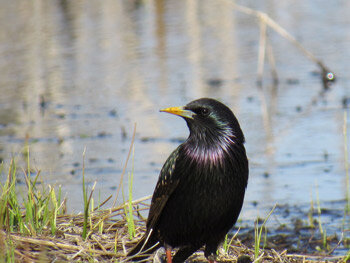
Photo courtesy Charles Martinez
This week’s Bird of the Week, compliments of the Weminuche Audubon Society and Audubon Rockies, is the European starling.
Originating from a small flock of around 100 birds released in New York in the late 1800s, the European starling is now one of the most numerous songbirds in North America. Here is another bird that typically lives around people, feeding in open grassy areas and agricultural fields, and using tree cavities or nooks in man-made structures for nesting.
The success of this bird is a result of its adaptability, coded for in its genetic makeup. It eats nearly anything, including insects, other invertebrates, berries, grains and seeds. Take a trip to the landfill and you will find hundreds of starlings sifting through our garbage for food. They are aggressive at feeders and compete fiercely for nesting cavities with other birds.
Feeding in flocks, as this bird does, has both benefits and costs. The downside is that a large group probing in the ground with heads down may quickly deplete the food available. For starlings, this cost is overshadowed by the advantage of a flock having more eyes to watch for predators, chief among them the peregrine falcon.
When a falcon is spotted, the flock will fly in a fantastic, swirling, shape-shifting cloud of starlings known as a murmuration. Communication moves quickly across the flock and the group responds as one, making it difficult for the falcon to capture a bird.
European starlings are chunky, blackbird-sized birds with short tails and long, slender beaks which are dark in winter and yellow in summer. New feathers grown in the fall have white tips which give the bird a spotted look in winter. By spring, the tips have worn away and summer birds are an iridescent purplish-green.
The ability to rapidly adapt to local conditions has allowed this European bird to now thrive on every continent except Antarctica.
For information on events, visit www.weminucheaudubon.org and www.facebook.com/weminucheaudubon/.